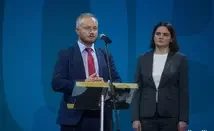If it weren’t for the strange reaction to it, the „manifesto“ of Sinitsyn and Parfianovich (these former members of the Lukashenka political elite, who define themselves as politicians opposing Lukashenka, have recently called for Belarus uniting into a single state with Russia) wouldn’t be worth a discussion. The freak-out of these two unscrupulous politicians was ignored by almost everyone. The „manifesto“, pleading for the annexation of Belarus, was written in such a manner, that its lines seemed to be soaked with the desire of its authors to find a sponsor.
Believing in Miracles
But the „manifesto“ unexpectedly caused nervous reaction from the other side – and namely from the part of Belarusian society, which still nourishes the illusion, that the salvation of Belarus from Lukashenka can come from Russia. However, this reaction is easy to explain. Being double-dyed anti-Belarusian and clearly idiotic, the „manifesto“ created a bad informational environment for other, veiled pro-Russian project, or, better to say, „projects of the projects“, which originate from the same background as the „manifesto“ and have the same ideology. This explains why the „titular opposition“, and Milinkevich (namely the open letter he wrote to Lukashenka on February, 8) were chosen as the target of the counter-attack.
Dialogue behind the Back
Another reason for such a conclusion is the fact, that these forces promote the EU-Russian dialogue as an alternative to EU-Lukashenka dialogue. They are actively pursuing the idea that something can change in Belarus only after it becomes the „zone of fruitful cooperation“ between Russia and EU.
The dilemma, which is being constructed, provides Lukashenka and Russia as the only variable. In other words, if not Russia, then Lukashenka. But this formula is nothing but the reversed bogeyman story by Lukashenka, which he has been telling during the oil and gas conflict with Russia, both at home and abroad!
Unpromising, but Indispensable
The strategy, which seeks the dialogue of the Belarusian opposition and Lukashenka, is unpromising in the short and middle run. However, the opposition has no right to fully reject such a possibility, remain without a plan and strategy in case the conditions for the dialogue appear. The experience of the democratic transformation in the region in 1989-1991 and during the recent color revolutions proves that without a tactical alliance with some part of the officials of the old regime it was almost never possible to gain power. Moreover, the regimes, which see no opportunity for such a dialogue, can remain frozen for decades, and their collapse is accompanied by such social catastrophes, that one has to really hate his own country in order to program it for such a scenario.
Escape Passages
The “escape passages” from such a state should be left open. The access to it should be strictly controlled, but the part of the regime, which would finally want change, should always know, that the way is open, and also know, what to do, in order to use it. Proposing a dialogue should not be a desperate cry, but a move of a serious political force. This is not a capitulation to the regime, but a challenge to it. Aliaksandr Milinkevich challenged the regime during the winter gas and oil conflict with Russia.
The higher prices for gas and oil wouldn’t be a threat to the independence of Belarus, if the Belarusian elite could face the new challenges from the point of national interests. However, what we saw was the faked „fight for independence“ staged by the regime and a weird position of the Belarusian counter-elite. It partially ignored the conflict, being absorbed into internal quarrels. Partially, it played a spectator cheering the fighting parties, and hoping that someone will finally hit Lukashenka real hard. The opposition failed to act as a responsible force. Lukashenka received great opportunity to show himself as a father and savior of the nation.
Milinkevich’s Trouble
Milinkevich was the only one who at least tried to act differently from the usual manner of the opposition politicians. He wrote a letter to Lukashenka, proposing cooperation in order to ensure the independence of the country. However, he did not abandon his principal positions. Milinkevich wrote that the dialogue with the West (ensuring the economic freedom of the country) can only be possible if the political system of Belarus is changed. It was not a letter to Lukashenka in the first place, but to the ruling elite, which, for its own reasons, is being more and more in favor of the independent Belarus.
The trouble of Milinkevich is that he didn’t make the next step, when Lukashenka refused the idea of the dialogue. Milinkevich should have publicly interpreted this as the insincerity of the official “independence” rhetoric, and position himself as the only true defender of the national interests. Unfortunately, this is not the only example, when the former opposition leader showed inconsistency. That is why we have to use the past tense while speaking about his leadership.
Abstention from Action
Still, Milinkevich was harassed not for him allegedly searching a compromise with the regime, but for his promise to keep away from actions which can threaten the independence of Belarus. Some part of the opposition and independent society seriously counted, that the winter pressure from Russia would be followed by certain political projects, which would be easy to fit into. The attack on Milinkevich was caused by his tough stance, which ruled out even the hypothetic possibility of the independent society participating in such projects.
Depicting Lukashenka as the defender of the Belarusian independence means creating the additional legitimacy for the regime, which, in turn, threatens the independence. But does it mean that Lukashenka is the only threat to the independence, that there is no such threat from the Russian side? Heart diseases are the major death factor, but it doesn’t mean no one dies from liver problems.
What Moscow Wants
Lukashenka has become the major threat to the independence, because all other threats were minimized in the course of the last ten years. The society does not favor the idea of Belarus fusing with Russia. The ruling elite are even more reluctant to support the integration. The Belarusian counter-elites have developed an instinct of self-preservation, that is why there is no true pro-Russian counter-elite in Belarus. Creating the chances for the implementation of the pro-Russian political projects means increasing the threat of Belarus loosing its independence.
The objectives of Kremlin in the gas and oil conflict were clear. Putin stressed that “Russia would go as far in the integration, as Belarus would be ready to go”. The foreign doctrine of Russia, approved in 2000, provides that one of the major goals of the Russian foreign policy is keeping Western structures away from the post-soviet territory. Putin’s Russia has grown nearly as repressive, as Belarus. The dialogue about the future of Belarus without Belarus participating in it can not have positive results. There is no unilateral Western policy towards Belarus, which means that the course of such a dialogue will be determined by the tough Kremlin’s position. The subject of such a dialogue can only be whether EU will agree to allow Moscow to implement Russian political projects in Belarus.
Russian elites and masses are now using the word “democracy” as a curse. They associate it only with promoting Western interests and anti-Russian regimes. The economic and military blackmailing of the former Soviet republics has sharply increased. Estonia is the most recent example. Belarus should also be prepared for such a pressure. The national elite would be able to stand up to it only if it is unified and solid.
The potential of the Russian-European dialogue about Belarus is no higher that of the EU-Lukashenka talks. But the political consequences of such a dialogue will be much graver – without any positive impact on the internal political situation in Belarus. The Russian-European talks can legitimize the principle of shaping the future of Belarus behind its back.
I am fully convinced that there is a need for a dialogue with Russia. It is needed in order to find the formula of strategic coexistence of Belarus and Russia as two independent countries. But such a dialogue must be conducted by the Belarusian civil society, which should propose the way the dialogue should be organized, determine the minimal common provisions, and be able to protect the national interests. We must grow up to be able to conduct such a dialogue. Delegating the responsibility for the future of the country to some other party – Europe, Lukashenka, or Russia – makes the consensus impossible.
























